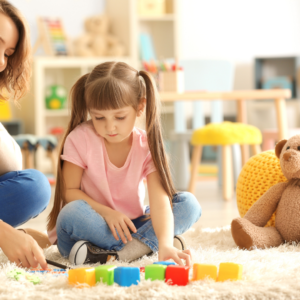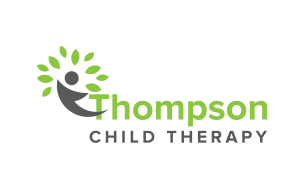You’ve most likely heard that children (and teens) learn best through play. If you haven’t heard that before, it’s true.
Neuroscientists have been researching this topic for over a century. Learning through play has a role in brain development. When learning a new skill, it’s important to trust your instructor. You must feel confident in their abilities to lead.

This is where oxytocin comes in. Play is an “emotionally engaging and creative experience that increases levels of oxytocin” in the brain.”
Oxytocin is the hormone that creates feelings of emotional health and connection. This is why therapists and parents must create and support a playful environment. It helps clients feel more relaxed and comfortable to discuss deep topics.
Compared to Talk Therapy, Play Therapy is more developmentally appropriate. Talk therapy works like a lesson learned in school — you learn a skill and have to apply it later… and we all know how many people actually retain and use trigonometry regularly. Since children learn best through play, they can generalize new skills in the moment of the play session, which is easily the most effective way to help your child/teen manage their behavior. In a play therapy session, we can help your child build self-awareness through a process called Reflecting. This is where the therapist verbalizes what we see and hear in a session. This approach is a mindful way of encouraging the child/teen to pay attention to his/her actions. It helps them see the impact they have on the environment around them.
It sounds simple, but there is a strategic approach to our typical treatment plan. First, I focus on helping children/teens manage their emotions. I do this by integrating the right and left-brain through playful skills teaching. The right brain handles emotions, creativity, and expression. The left brain handles logic, reasoning, and rules.
In working each side of the brain together, it helps the logical part of the brain feel safe, so the right side can express inner emotions. It also helps them feel safe in our relationship. As a result, clients learn how to solve problems creatively. This helps them later in life to persist through challenges with minimal frustration.
In my approach, I use your child’s mirror neurons to help them feel more comfortable in our sessions. Mirror neurons allow us to process information in our environment and mimic what we see. This allows the child to mimic my calm, patient demeanor. As a result, they feel more patient with themselves and their inner emotions. We use this as a tool to help them make sense of stressful events and help process reactions. It also works to get through difficult topic discussions through various sessions.
The bottom line is this: all clients MUST feel relaxed to get the most out of sessions. If not relaxed, children and teens will struggle to use their imagination. They need this to consider the possibility of behavior change.
If you’d like to learn more about how Play Therapy works, send us a message on our Contact page!


